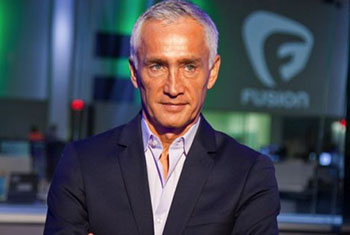|
Fusion Sets Its Sights on a Multicultural Generation Miami, FL (by Larry Rohter) - Since 1986, Jorge Ramos has anchored the Univision network’s 6:30 p.m. news broadcast, a vital source of information for the nation’s 50 million-plus Spanish speakers. But this week, his routine will change in a way that could have profound consequences not just for him but also for the American media landscape. At 5 p.m., Mr. Ramos will host a new hourlong English-language public-affairs program called “America With Jorge Ramos,” the highest-profile offering of a new cable network called Fusion, a venture of Univision and ABC. He will then walk a few steps into an adjacent studio, put on a tie and prepare to deliver the day’s news in Spanish, just as he always has. “Everything is new,” Mr. Ramos, 55, said after a run-through this month for “America” at the vast newsroom and studio complex that Univision, flush with money from ratings in some categories that now surpass those of the four big English-language networks, has just finished near the airport here. “New language, new format, new studio, new lighting.” In essence, Fusion can be seen as Univision’s response to the same demographic changes that are upending American politics and advertising. Latinos are the biggest ethnic minority in the United States, expected to reach 25 percent of the population by 2035. But with immigration down since the economic crisis of 2008, American-born Hispanics, who are English dominant, now represent the biggest chunk of that growth. Initially, Fusion’s target audience was those young Hispanics, who constitute 20 percent of their age group. But after more research, Fusion’s management decided to aim for the entire millennial generation. “We found that good content for Hispanic millennials is good content for any millennial,” Isaac Lee, Fusion’s Colombian-born chief executive and the president for news at Univision, said in an interview in his newsroom office. “You cannot treat young Hispanics as Hispanics. They want to be part of one conversation in one room. They don’t want to be ghettoized.” In its effort to reach that coveted audience, Fusion has gone on something of a hiring binge, snatching up young bilingual and bicultural Hispanic talent. Alicia Menendez, a Cuban-American lately of The Huffington Post, has been given the 6:30 p.m. slot, and at 10, León Krauze, who began his career as a sports radio reporter in Mexico City and is now an anchor at KMEX, Univision’s Los Angeles affiliate, will host a show called “Open Source.” Both Ms. Menendez and Mr. Krauze come from families known to Hispanics: Her father is Senator Robert Menendez of New Jersey, his the historian Enrique Krauze, perhaps Mexico’s most prominent public intellectual. But in a bet on the multiculturalism said to be second nature to millennials, Fusion has also recruited talent from outside the Latino orbit. A program called “DNA,” for example, will be hosted by the musician and political activist of that nickname, Derrick Ashong, who was born in Ghana, raised in the Middle East and New Jersey, educated at Harvard and most recently hosted a program called “The Stream” for Al Jazeera English. And Yannis Pappas, a Greek-American comedian from Brooklyn, will be joining a Venezuelan and a Brazilian as hosts of the two-hour “Morning Show.” Fusion’s strongest selling point, however, is Mr. Ramos, whom Ben Sherwood, president of ABC News, describes as “Walter Cronkite and Edward R. Murrow wrapped into one.” Born in Mexico City, Mr. Ramos began his career as a radio reporter there, left in 1983 after chafing at political restrictions on his work, then worked at KMEX before moving east and emerging as the dominant figure in Spanish-language media in the United States. In 2008 he became an American citizen. During the interview, conducted at his request in English, Ramos acknowledged that “America” would take him out of his comfort zone. With a determined, earnest manner, he cast the new venture as a battle for relevancy in the face of generational shifts. “I have to reinvent myself to reach that market,” he said, referring to millions of young Hispanics who know his name but not his work. “These are kids who meet me and never say, ‘I watch your newscast.’ They say, ‘My mom and dad watch you,’ or ‘My grandparents watch you.’” Ramos is well aware that young viewers, Hispanic or otherwise, may not respond. Asked whether it might not be too early for a network like Fusion, he agreed that this was a risk, but added: “The other risk is that we might be too late. The problem is that maybe they are not watching television anymore.” Nevertheless, he seems convinced that time, and numbers, are on his and Fusion’s side. “All the talk of many years about the sleeping giant, well, he’s well awake and running now,” he said. “Eventually, I’ll be able to interview the first Hispanic president of the United States. That’s what’s coming, and I have to be part of that transformation.”
|
|
|
Este sitio ha sido desarrollado y mantenido por Javier López Advertising, Inc.
|




